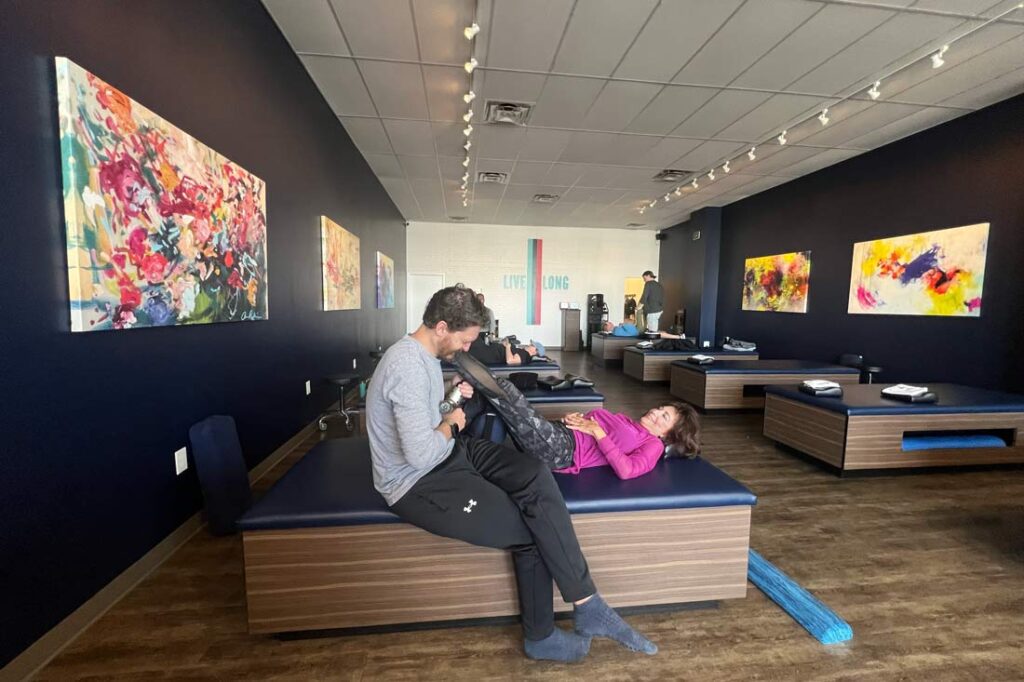Your dog or cat probably does it every morning and after rousing from a long nap: a long, deep stretch, the type that’s inspired the names of yoga poses. We humans mostly stretch as a quick pre- or post-workout activity, though we have something to learn from our four-legged friends.
Studies have shown that regular stretching has proven benefits ranging from increased flexibility and range of motion to improved blood flow and injury prevention. One fast-growing company, StretchLab, is helping athletes and non-athletes alike learn how to incorporate stretching into their routines so they can move their bodies better. If you haven’t already spotted a StretchLab location near you, you may soon. The company is growing fast and has opened more than 900 locations worldwide since it was founded in 2015.
In a famously active state like Colorado, clients have plenty of different stretching needs to keep the licensed “flexologists” busy at the three Denver-area StretchLab studios owned by Andrea Schott and her husband, Trey. During one-on-one assisted stretching—or the occasional group session—these flexologists might help recreational skiers, snowboarders, golfers and pickleball players prepare for their seasons or recover from injury. They also help competitive ice skaters, gymnasts and bikers who want to progress in their careers. But there are plenty of people who have more relatable goals, like improving flexibility for their fitness routine, bending down to tie their shoes with more ease or feeling less achy when playing with their grandkids.
“There’s just so many ways that we can touch people’s lives and make an impact,” says Schott, whose background is in physical therapy and athletic training. “When you don’t have mobility or your full mobility or you have some pain or something that’s limiting your activity, life kind of stops. And you don’t have to live that way.”
What is StretchLab?
Unlike other fitness studios, the environment at StretchLab is intentionally calming and interactive, though it sometimes takes people a few sessions to “melt into the stretch,” Schott says. Most people enroll in assisted stretching sessions for at least three months at her studios, with some attending for more than a year. Success looks different depending on a client’s goals, and Schott says one of the most gratifying experiences has been helping a professional cellist return to performing in area orchestras.
That cellist is Andrea Meyers, who has attended 340-plus stretching sessions since 2020. Like many people, stretching was mostly something she did alongside regular workouts. But her perception of the benefits of stretching profoundly transformed after she could no longer play cello or conduct orchestras in the wake of her 2016 breast cancer diagnosis—and a double mastectomy and subsequent medical treatments that followed thereafter.
“Music, particularly playing the cello, had always been my source of strength and liberation,” Meyers says. “However, the trauma and depression that followed the diagnosis made even the simple act of lifting my cherished instrument seem insurmountable.”
The benefits of stretching—beyond being a pre-workout activity
Meyers sought out StretchLab as part of a holistic approach to her cancer recovery because she wanted to explore a more comprehensive and specialized technique for stretching. Within a month of consistent assisted stretching, she was performing with more ease, greater confidence, less pain and more mobility.
Though it’s been more than seven years since her initial diagnosis, Meyers continues with assisted stretching even now that doctors have deemed her cancer-free. “Consistently incorporating these stretches into my routine not only brings physical benefits, but also provides a sense of empowerment and control, making stretching a cornerstone in my journey of recovery and allowing me to maintain a fulfilling and active lifestyle,” she says.
For Schott, seeing the type of impact stretching has had on Meyers—restoring a passion that cancer had seemingly taken away—is one of the “really great” parts of her job. And unlike her former life, Schott says StretchLab offers dedicated time just for stretching, which many physical therapists have to forgo and assign as homework instead.
StretchLab is spreading the word on stretching
Relationships with other health providers including physical therapists, athletic trainers and even stores like Fleet Feet help spread the word about the benefits of a dedicated stretching practice, Schott says. And some insurance companies are beginning to extend their policies to cover a few sessions each month. Otherwise, sessions at Schott’s locations start at $29 for a first-timer in a 25-minute session or $49 for a 50-minute session. Subsequent sessions are $60 or $105-plus.
Still, she hopes people see the value of stretching in the context of self-care and wellness as an opportunity to learn how to better move the “amazing machine” that is their body. Helping people walk out of the studio feeling better than when they came in is the goal.
“We love what we do because we can impact lives,” Schott says. “And if you can do a job like that every day, it makes you feel pretty good at the end of the day.”
Photo courtesy of StretchLab Colorado.



